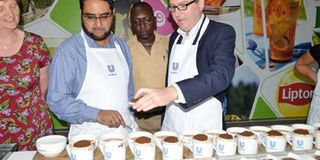UK to negotiate better trade deals with Kenya after Brexit

British High Commissioner to Kenya Nic Hailey (right) and Niaz Tarmahomed (centre), the procurement manager at Unilever Kenya, taste tea at the company’s offices in Mombasa on January 24, 2017. Mr Hailey revealed that UK will negotiate better trade deals with Kenya after completing the exit process from EU. PHOTO | KEVIN ODIT | NATION MEDIA GROUP
What you need to know:
- Britain voted to exit the EU in June 2016, sending shockwaves across markets.
- UK will negotiate new trade deals with Kenya, especially for agricultural products including tea and flowers.
- The UK is the third largest importer of tea from the region, having imported 45 million kilos in 2015 according to the EATT.
- The country is also one of the leading investors in the sector in the country, through Unilever Kenya.
Kenya should expect better deals with the United Kingdom once the country completes the process of leaving from the European Union, UK High Commissioner to Kenya Nic Hailey has said.
Mr Hailey said with reduced restrictions that come with membership in a trade bloc like the EU, Britain would negotiate better and lucrative agricultural produce deals with Kenya.
“Once the process of exiting is complete, the UK will negotiate new trade deals with Kenya, especially for agricultural products including tea and flowers, which we expect will be better for the country,” Mr Hailey said.
He spoke Tuesday when he visited Unilever Kenya offices in Mombasa.
Britain voted to leave the EU in June 2016, sending shockwaves across markets and setting in motion a process that would see the country renegotiate individual trade pacts.
MOMBASA TEA AUCTION
Earlier, the High Commissioner paid a visit to the Mombasa tea auction, where the UK government, through TradeMark East Africa, is investing Sh155 million for the automation of the largest black tea auction, managed by the East Africa Tea Trade Association (EATTA).
The automation started in November 2016.
Mr Hailey noted that automation will increase transparency and reduce the total time taken in the trading cycle by over 65 per cent, which means that farmers will be paid faster.
“Increasing transparency and confidence in the auction will result to an increase in the volume and value of teas traded through the auction system by an estimated 15 per cent,” he said.
TEA EXPORTS TO UK
The UK is the third largest importer of tea from the region, having imported 45 million kilos in 2015, according to the EATT.
The country is also one of the leading investors in the sector in the country, through Unilever Kenya.
Kenya earned Sh120 billion from tea exports in 2016, down from Sh125 billion in 2015, although these figures are projected to rise to Sh133 billion in 2017.
The earnings were from 473 million kilogrammes, a rise of 18 per cent from 399 million kilogrammes in 2015.
The Mombasa auction trades in tea from other countries in the region, including Uganda, Rwanda, Burundi, Tanzania, Malawi and Zambia, and handles over 75 per cent of tea exported from the region.





